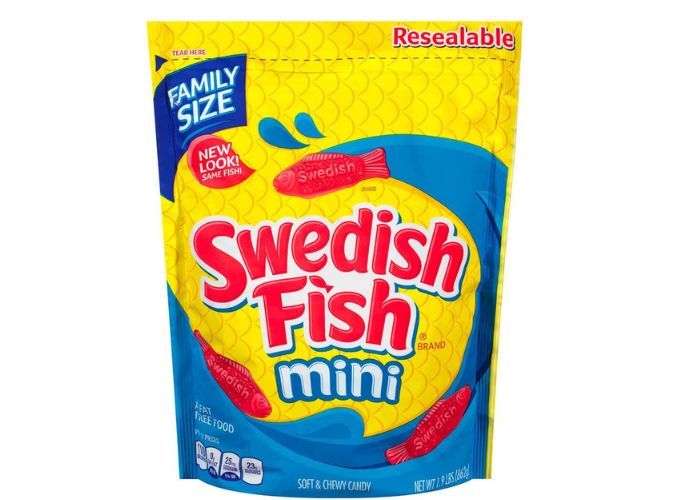Swedish Fish is a popular candy known for its chewy texture and fruity flavor. Many people enjoy it, but if you follow Islamic dietary laws, you might wonder, “Is Swedish Fish halal?” This post will dive into what makes food halal and whether this beloved treat meets those standards. Join us as we explore the ingredients of Swedish Fish and uncover if they fit into a halal diet.
Understanding Halal Certification
Understanding Halal Certification means knowing how foods get approved as okay for Muslims to eat. Halal foods must not have anything forbidden by Islamic law, like alcohol or pork, and they must be made in a clean way that respects Islamic rules. When a food gets a halal certificate, it has passed checks by experts who make sure it meets these rules. This certificate is a big help for Muslim shoppers because it quickly shows them that the food is safe to include in their diet according to their faith. So, halal certification is like a promise that the food respects Islamic dietary laws, making it easier for Muslims to choose what to eat without worry.
The Appeal of Swedish Fish Varieties

The wide range of Swedish Fish varieties ensures there’s something for everyone, whether you prefer the classic berry flavor of the original red, enjoy the citrusy assortment of the variety pack, or like the tangy kick of the sour version. The introduction of new flavors and shapes keeps the brand fresh and exciting, continually attracting new fans while retaining the loyalty of long-time Swedish Fish enthusiasts.
Regardless of the variety, Swedish Fish remain a popular choice for those seeking a gelatin-free, chewy candy option. Their distinct texture and flavor profiles have made them a staple in the candy aisle and a favorite for gatherings, movie nights, and as a sweet treat to enjoy any time.Here’s a look at some of the Swedish Fish varieties available:
Original Red Swedish Fish
The original flavor of Swedish Fish is a unique berry-like taste often described as lingonberry, which is closely associated with Swedish cuisine. This classic red fish has a distinct, mildly sweet flavor that has won over countless fans worldwide.
Assorted Flavors
Swedish Fish now come in an assortment of flavors and colors, including orange, lemon (yellow), lime (green), and the original red. These packs offer a fruity bouquet of flavors, making each bite a new experience.
Each color in the variety pack corresponds to a specific fruit flavor, with orange, lemon, and lime adding citrusy notes to the mix, complementing the original berry flavor of the red fish.
Sour Swedish Fish
For those who enjoy a tangy twist, Sour Swedish Fish introduce a sour coating that gives the classic chewy candy a zesty kick. These are available in the same fruity flavors but with an added layer of sour sugar.
Swedish Fish Mini
Mini Swedish Fish offer the same great taste as the original but in a smaller size, making them perfect for snacking or sharing. These mini versions are available in both the original red flavor and assorted flavors.
Swedish Fish Tails
A fun twist on the classic, Swedish Fish Tails feature dual flavors in one candy, with each piece sporting two different colors and flavors. These combinations provide a unique tasting experience with every bite.
Limited Edition and Seasonal Varieties
Occasionally, Swedish Fish releases limited edition flavors or seasonal varieties, such as holiday-themed shapes or summer fruit flavors. These special editions often offer a unique twist on the classic candy and are available for a limited time.
[If you like Sour Patch, you might interested to know Is Sour Patch Halal?]
Ingredients in Swedish Fish.
Swedish Fish are known for their unique, chewy texture and sweet taste, but what exactly are they made of? Let’s break down the ingredients typically found in Swedish Fish to understand better what’s inside this popular candy.
Sugar: This is the primary ingredient, providing the sweet taste that Swedish Fish are known for. Sugar is a basic carbohydrate that adds calories and energy to the candy.
Invert Sugar: Invert sugar is made by breaking down sucrose into glucose and fructose, which are simpler sugars. This process not only adds sweetness but also helps to keep the candy moist and extends its shelf life by preventing crystallization.
Corn Syrup: Corn syrup, another sweetener, is used to give Swedish Fish their soft and chewy texture. It’s a form of glucose syrup made from corn starch.
Modified Corn Starch: This ingredient acts as a thickener and stabilizer, contributing to the gummy texture of Swedish Fish. The modification process changes the starch’s properties, making it more effective in candy production.
Citric Acid: Citric acid is added to balance the sweetness with a slight tartness, enhancing the overall flavor profile of the candy.
White Mineral Oil: Used in small quantities, white mineral oil helps to prevent the candy from sticking together. It’s a highly refined, food-grade oil that’s safe for consumption.
Natural and Artificial Flavor: These flavors give Swedish Fish their distinctive taste. The specific natural and artificial components are proprietary to the manufacturer.
Red 40: This synthetic dye gives Swedish Fish their characteristic red color. It’s one of the most commonly used food colorings in the United States.
Carnauba Wax: Used as a coating, carnauba wax provides a shiny finish to the candy and helps prevent it from sticking to packaging materials.
Is Swedish Fish Halal
Based on our research, Swedish Fish are considered halal. This determination comes from a careful analysis of the candy’s ingredients and manufacturing process. Swedish Fish do not contain gelatin, which is a common concern for halal compliance, as gelatin often comes from pork or non-halal beef sources. Instead, they use plant-based gelling agents like modified corn starch, making them suitable for those following a halal diet.
Moreover, the absence of alcohol in the flavoring and the use of synthetic colors, which do not derive from prohibited sources, further supports their halal status. The manufacturing process for Swedish Fish also adheres to cleanliness and contamination prevention standards that align with halal dietary guidelines.
It’s important for Muslim consumers to note that while individual ingredients in Swedish Fish meet halal criteria, certification by a recognized halal authority would offer additional reassurance. However, the analysis of ingredients and available information about their production process indicates that Swedish Fish can be considered halal, allowing them to be a permissible treat for those adhering to Islamic dietary laws. Always check the latest packaging and manufacturer statements for the most current information, as formulations can change.
Considerations for Muslim Consumers
For Muslim consumers interested in whether Swedish Fish are suitable for their diet, here are some key points to consider:
Check Labels Regularly: Ingredients can change, so it’s important to read the product labels every time you buy to ensure nothing haram has been added.
Look for Halal Certification: If available, choose products that have a clear halal certification mark from a reputable organization. This guarantees the product meets strict dietary standards.
Research and Ask Questions: If you’re unsure about the halal status of Swedish Fish or any other product, don’t hesitate to contact the manufacturer directly. They can provide the most current and detailed information about their ingredients and processing methods.
Be Mindful of Cross-Contamination: Even if the ingredients are halal, the manufacturing process might involve shared facilities with non-halal products. If this is a concern, seek products that guarantee no cross-contamination.
By keeping these considerations in mind, Muslim consumers can make more informed choices about including Swedish Fish and similar products in their diets.
FAQs
Are Swedish Fish made with gelatin?
No, Swedish Fish do not contain gelatin. They are made with modified corn starch, which gives them their chewy texture, making them a potential option for those avoiding animal gelatin for dietary or religious reasons.
Can Swedish Fish be considered vegan?
Since Swedish Fish do not contain gelatin and are made with plant-based ingredients, they are often considered suitable for a vegan diet. However, individuals concerned about artificial colors or other specific ingredients should check the latest product labels.
How can I find out if a specific brand of Swedish Fish is halal certified?
To find out if a specific brand of Swedish Fish is halal certified, look for a halal certification mark on the packaging or contact the manufacturer directly for up-to-date certification information.
Are the artificial colors used in Swedish Fish halal?
The artificial colors in Swedish Fish, such as Red 40, Yellow 6, Yellow 5, and Blue 1, are chemically synthesized and do not contain animal products. However, for them to be considered halal, they must also be processed and handled according to halal standards. It’s best to consult with the manufacturer or a halal certification body for specific details.
Is there a risk of cross-contamination with non-halal products in the production of Swedish Fish?
The risk of cross-contamination depends on the manufacturing practices of the facility where Swedish Fish are produced. Facilities that strictly adhere to halal standards minimize this risk, but it’s important to confirm with the manufacturer regarding their specific practices.
Do halal certification bodies check for things like cross-contamination?
Yes, reputable halal certification bodies assess various factors, including the ingredients, processing methods, and the risk of cross-contamination with non-halal substances, to ensure that products meet halal standards.
Conclusion
While the ingredients of Swedish Fish suggest they might be suitable for a halal diet, the absence of official halal certification means Muslim consumers should proceed with caution. It’s important to regularly check labels, seek out certified products when possible, and contact manufacturers for the most accurate information. By doing so, consumers can make informed decisions about whether Swedish Fish align with their dietary requirements, ensuring they adhere to halal guidelines.










Leave a reply